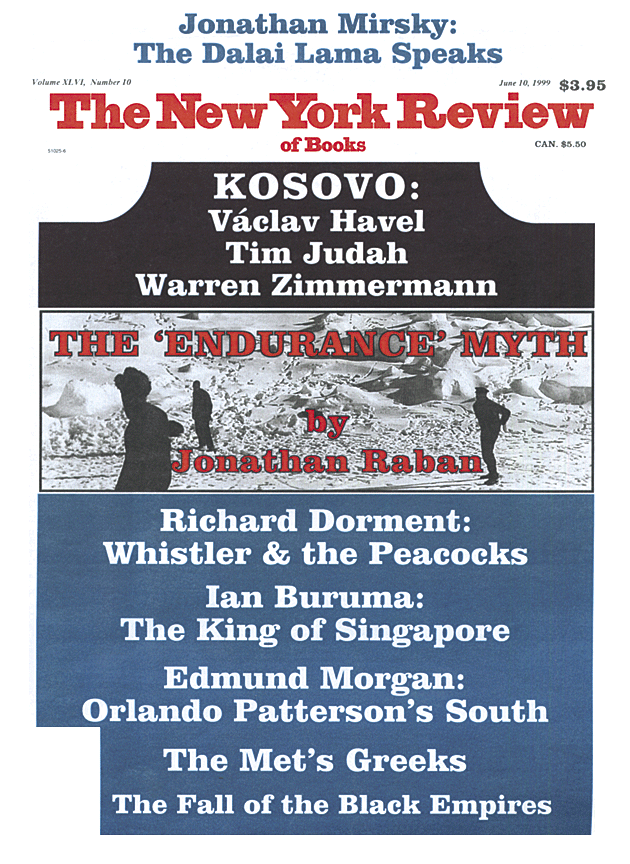In response to:
'A Fugitive from Egypt and Palestine' from the February 18, 1999 issue
To the Editors:
In his review of my edition of Hannah Arendt’s Rahel Varnhagen: The Life of a Jewess [“A Fugitive from Egypt and Palestine,” NYR, February 18], Amos Elon writes that I contend that Arendt was somehow in the wrong for using the book as an instrument in her successful postwar suit for monetary compensation for her aborted academic career in Germany. As a Jew, Arendt had been unable to properly register for her Habilitation degree in 1933; according to Mr. Elon, I make a “preposterous claim” if I suggest otherwise. I agree with Mr. Elon that such a claim would be preposterous, indeed. I did not make it. Instead, I provide evidence that Arendt never intended her book to be an academic thesis, but an experimental biography.
When she applied retroactively for the Habilitation to be recognized in the late Sixties, Mr. Elon writes, she did so with the full support of her pre-war thesis advisor, Karl Jaspers, and of Martin Heidegger. I provide evidence, however, that Jaspers was highly critical of her project and only agreed to certify its scholarly status after the war as a favor to Arendt. Martin Heidegger, moreover, did not participate in the reevaluation of Arendt’s book after the war, as Elon suggests. Rather, I only note the curious fact that he had supported Arendt’s work before the war with a letter of recommendation to a Jewish fellowship-granting institution.
About a year ago, Mr. Elon contacted me in regard to my claim that Arendt had quoted Varnhagen’s deathbed sentence only partially: Varnhagen was pleased to have been born a Jew, but continues to suggest that she relates to Jesus’ and Mary’s suffering. If Varnhagen became a sincere Christian, as was probably the case, Arendt’s main argument of her renewed embrace of Judaism becomes questionable. I gave Mr. Elon the page references in my edition where I suggest this, and offered the source that Arendt consulted; in addition, I gave Mr. Elon the full quotation in question. I am pleased, therefore, that he quotes it in his review, even if he does clearly indicate that this is his discovery, and not that of the “diligent Ms. Weissberg.”
I take Mr. Elon’s repeated reference to my diligence as praise, and would have only wished that he had paid closer attention to the text that I have written.
Liliane Weissberg
Joseph B. Glossburg Term Professor in the Humanities and Professor of German and Comparative Literature University of Pennsylvania
Philadelphia, Pennsylvania
Amos Elon: replies:
I am afraid Ms. Weissberg gives no “evidence” that Arendt never intended her book as a postdoctoral thesis to support a possible appointment to a teaching post at a German university before 1933. On the basis of her assumption that Arendt’s book on Varnhagen was just an “experimental biography,” and not a postdoctoral thesis as Arendt claimed, she does, in fact, suggest in her introduction that Arendt cheated the German government in her restitution application after the war for the loss of an academic career in Germany.
The German appellate court which considered her suit thought differently, and rightly so. The German court had no doubts—nor can anyone have such doubts today—that if the Nazis had not come to power, and with the learned support of such leading scholars as Jaspers and Heidegger, Arendt would have eventually qualified for an academic career at a German university. The court recognized Arendt’s extraordinary circumstances in 1933 and Ms. Weissberg should have recognized them, too. The book was not finished and even if it were, Arendt—at that time she was in and out of a Gestapo prison and on the eve of illegally leaving Germany without travel papers—would and could not have formally submitted it as a Habilitationsschrift to aGerman university.
This Issue
June 10, 1999


